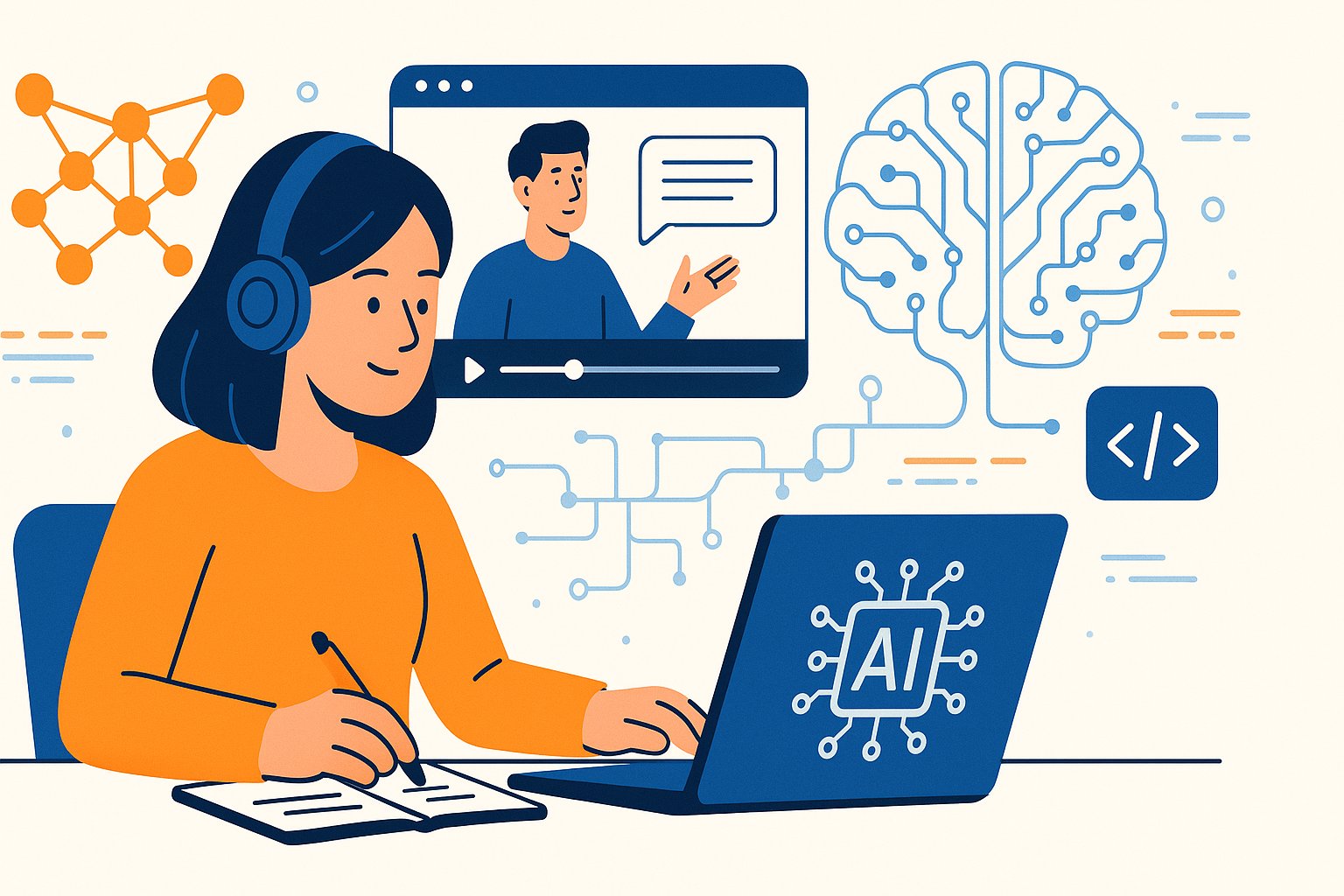21 Top AI Courses for IT Consultants in 2025
Discover the leading AI courses for IT consultants in 2025. Enhance your skills with cutting-edge programs designed to propel your career. Stay ahead in the tech landscape with insights into the best training options available.

As artificial intelligence (AI) continues to permeate every facet of technology and business, the urgency for IT Consultants professionals to upskill and remain competitive is more critical than ever. With AI's rapid advancement, those working in IT consulting are uniquely positioned to harness its capabilities for optimizing business processes and driving innovation. However, staying ahead requires a clear understanding of the latest AI tools and methodologies. This article provides a comprehensive guide to some of the most valuable AI courses available, specifically curated for IT Consultants professionals keen on enhancing their expertise and securing their roles in a technology-driven future.
Why AI matters for IT Consultants today
AI's significance for IT Consultants professionals cannot be overstated. As businesses increasingly adopt AI—69% of companies have integrated AI into their operations—it becomes essential for consultants to understand how to implement and leverage these technologies effectively. This article aims to help IT Consultants professionals identify the best AI courses, offering insights into how each program can address their unique needs and career aspirations.
The Growing Role of AI in IT Consultants
The role of AI within IT consulting extends beyond simple automation. AI's applications in this field include enhancing decision-making processes, personalizing client solutions, and streamlining complex workflows. By integrating AI, IT consultants can improve efficiency and provide more strategic value to their clients. AI is reshaping how consultants approach problem-solving, helping them deliver more precise and customized solutions in a fraction of the time.
Benefits of becoming an AI expert in IT Consultants
For IT Consultants professionals, gaining AI expertise offers significant benefits. It enhances their ability to provide cutting-edge solutions and positions them as leaders in technology consulting. Mastering AI allows consultants to better anticipate client needs, offer innovative solutions, and navigate the complexities of AI-driven projects with confidence. Moreover, having a deep understanding of AI can lead to new opportunities in consulting, enabling professionals to lead in strategic planning and execution of AI initiatives.
This article will compare 21 AI courses in this field, including CompleteAI Training, which offers a comprehensive library of over 100 specialized video courses and certifications tailored for IT Consultants professionals. Subscribers to this program can access daily updates on AI tools and industry news, ensuring they remain informed about the latest developments in AI technology.

Comparison: All AI Courses for IT Consultants (Updated Q2' 2025)
| Course Name | Provider | Price | Key Topics | Pros | Cons | Best For |
|---|---|---|---|---|---|---|
| AI for IT Consultants | Complete AI Training | $29/month (monthly), $8.25/month (annually) | Specialized video courses, certifications, AI tools, industry news | Highest rating, Extensive courses, Daily updates, Affordable | Subscription based | IT Consultants professionals |
| Artificial Intelligence Nanodegree Program | Udacity | $148.50/month or $504.90 for 4-month bundle | Optimization algorithms, minimax search, Bayesian networks | Industry pioneers, Hands-on projects, Strong foundational coverage | Requires prior Python knowledge | General learners |
| AI, Deep Learning and MLOps Courses | DeepLearning.AI | Free; $39-$99/month for Coursera access | Machine learning, MLOps, Deep learning | Renowned instructors, Broad topics, Flexible pricing | Advanced courses require prior knowledge | General learners |
| Certificate in Artificial Intelligence and Machine Learning | California Institute of Applied Technology (CIAT) | Tuition varies; financial aid available | Senior Machine Learning Engineer, AI Solutions Architect roles | Live instruction, Practical labs, Career-focused | Requires IT experience | General learners |
| Big Data, Artificial Intelligence and Ethics | University of California, Davis (via Coursera) | Free to audit; paid certificate available | Big data, AI ethics, IBM Watson | Beginner-friendly, Flexible pacing, Ethical focus | Short duration, Introductory level | General learners |
| AI for Business Specialization | University of Pennsylvania (Wharton) via Coursera | $79 for full 4-month specialization | AI in marketing, finance, HR, TensorFlow, AutoML | Business-focused, Practical applications, Affordable | Requires 2 hours/week commitment | General learners |
| CS50’s Introduction to Artificial Intelligence with Python | Harvard University | Free to audit; $299 for certificate | Graph search, reinforcement learning, AI projects | Theoretical and practical balance, Harvard credential | Time-intensive | General learners |
| Interpretable Machine Learning | Cynthia Rudin, Duke University (YouTube Channel) | Free | Interpretable ML concepts, algorithms, mathematical intuition | Advanced theoretical focus, Free | More academic, less hands-on | General learners |
| Artificial Intelligence Graduate Certificate | Stanford University School of Engineering | Not specified | AI principles, machine learning, robotics, NLP | Prestigious institution, Comprehensive coverage | Requires bachelor's degree, calculus, programming experience | General learners |
| Professional Certificate Program in Machine Learning and AI | Massachusetts Institute of Technology (MIT) | $2,500-$4,700 | Cognitive technology, predictive modeling | Taught by MIT professors, Intensive | Expensive, Requires technical background | General learners |
Understanding AI Training for IT Consultants Professionals
Artificial intelligence (AI) is reshaping industries, including IT consulting. For professionals in this field, staying updated with the latest AI advancements is crucial. A variety of courses are available to enhance skills and knowledge, each offering unique benefits and challenges. This article provides a detailed comparison of AI courses designed for IT consultants, highlighting their features, advantages, and potential drawbacks.
Course 1: CompleteAI Training
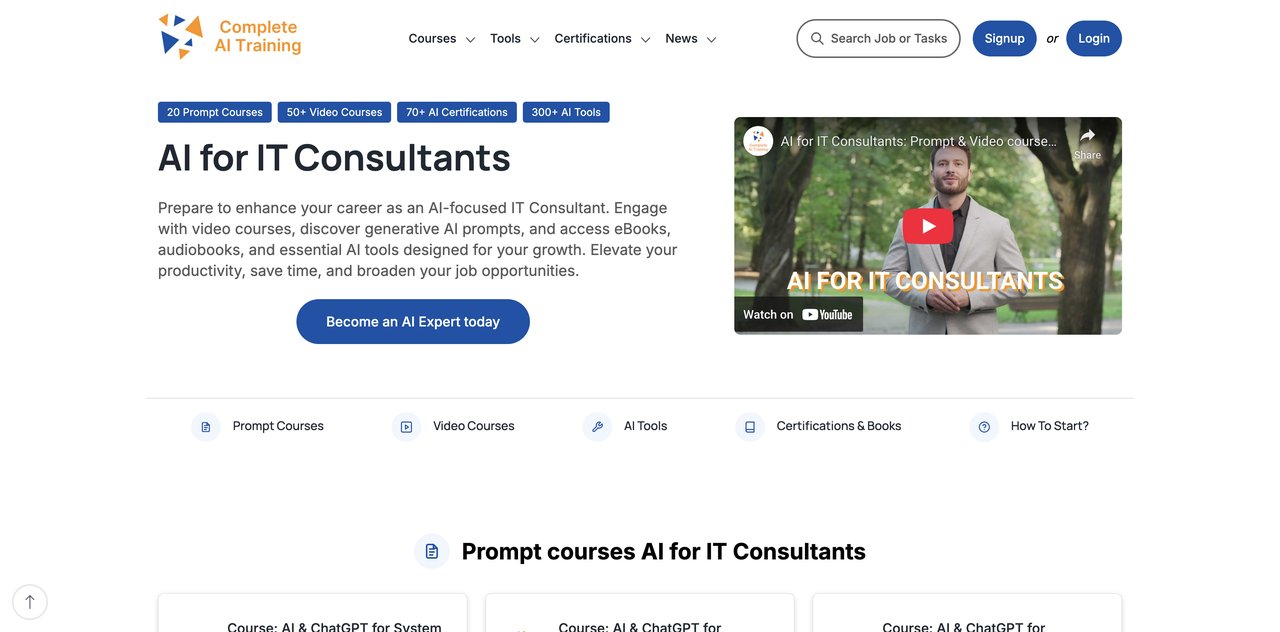
Complete AI Training for IT Consultants offers a comprehensive library of over 100 specialized video courses and certifications. Tailored specifically for IT consultants, this platform provides a robust AI education with daily updates on AI tools and industry news. The courses are available via a subscription model, with affordable pricing options.
Key Topics Covered: AI fundamentals, advanced AI techniques, and industry-relevant tools.
Target Audience and Skill Level Requirements: Designed for IT consultants seeking to enhance their expertise in AI.
- Pros:
- Extensive course offerings tailored to IT consultants.
- Daily updates on AI tools and news.
- Affordable pricing, especially with annual billing.
- Cons:
- Subscription-based model requires ongoing commitment.
Who Would Benefit Most: IT consultants looking for a comprehensive and current AI learning platform.
Course 2: Artificial Intelligence Nanodegree Program by Udacity
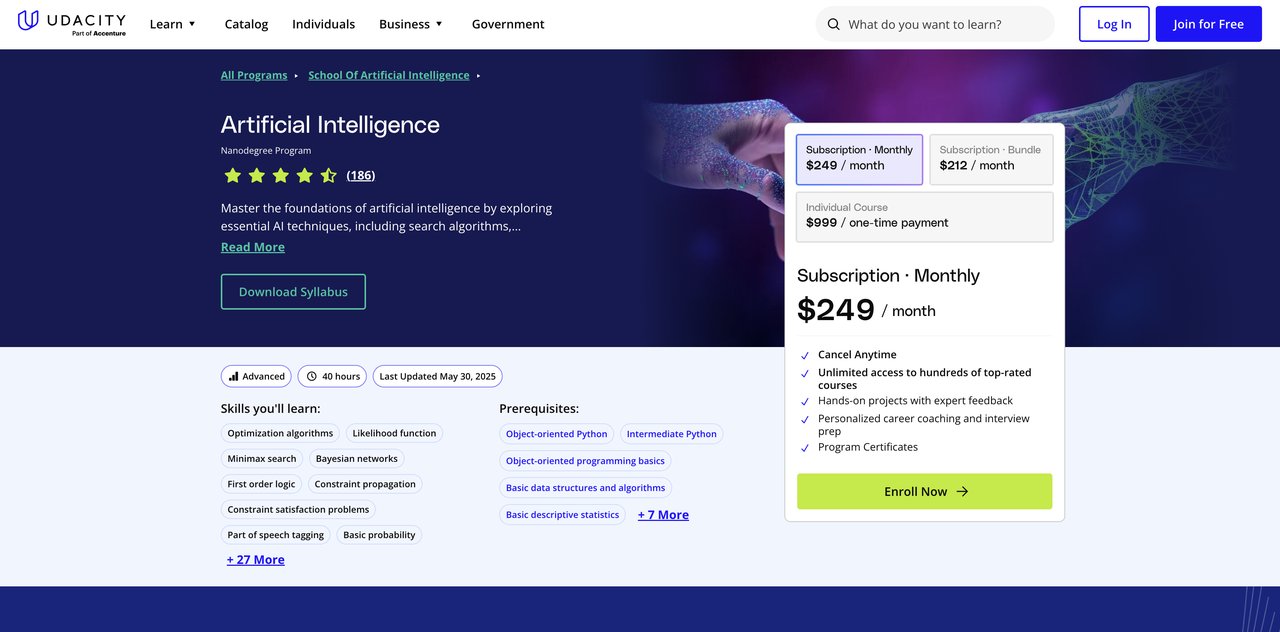
The Artificial Intelligence Nanodegree Program from Udacity covers foundational AI concepts, including optimization algorithms and Bayesian networks. The program emphasizes hands-on projects, allowing participants to apply theory to real-world scenarios. A prerequisite is knowledge of object-oriented Python programming.
Key Topics Covered: Optimization algorithms, Bayesian networks, intelligent agent design.
Target Audience and Skill Level Requirements: Suited for individuals with prior Python programming knowledge.
- Pros:
- Instruction by industry pioneers.
- Hands-on project experience.
- Strong foundational coverage.
- Cons:
- Requires prior Python knowledge.
Who Would Benefit Most: IT professionals who are comfortable with Python and seek to deepen their AI knowledge through practical projects.
Course 3: AI, Deep Learning and MLOps Courses by DeepLearning.AI
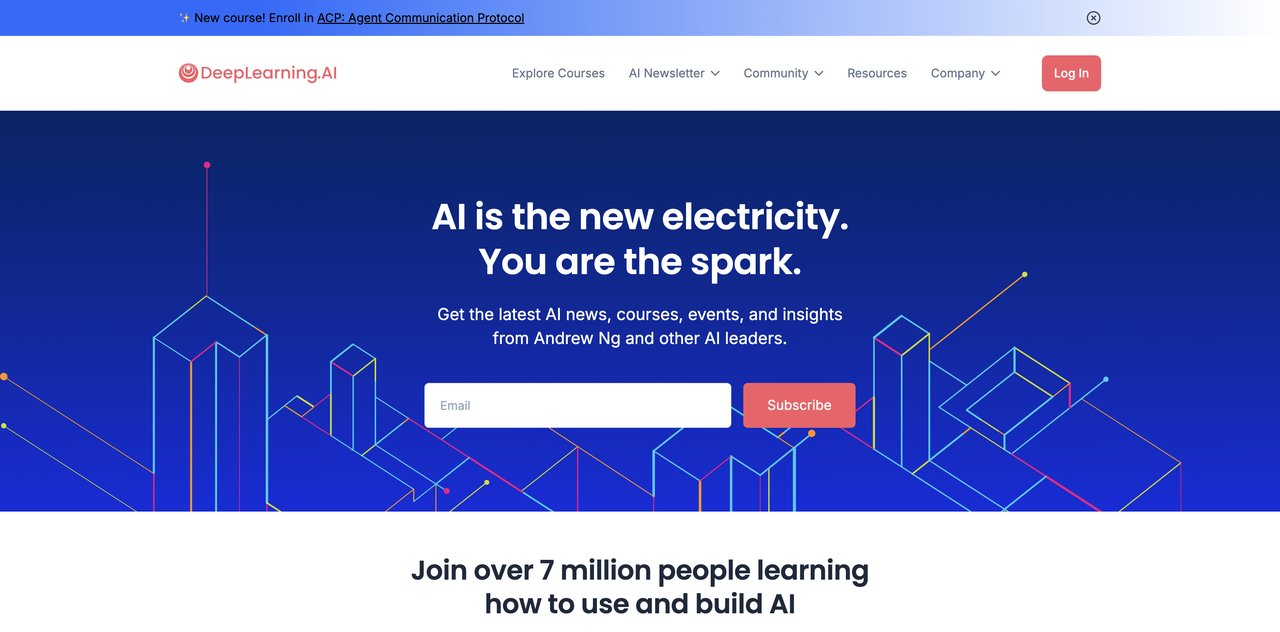
DeepLearning.AI offers a wide range of courses, from non-technical introductions to advanced specializations in machine learning, MLOps, and deep learning. The courses cover topics like ChatGPT prompting and generative AI, with flexible pricing options ranging from free to paid access.
Key Topics Covered: Machine learning, MLOps, deep learning, generative AI.
Target Audience and Skill Level Requirements: Suitable for learners of various skill levels, from beginners to advanced professionals.
- Pros:
- Renowned AI expert Andrew Ng as instructor.
- Broad range of topics.
- Flexible pricing options.
- Cons:
- Some advanced courses require prior knowledge.
Who Would Benefit Most: IT consultants interested in a broad and flexible AI learning experience.
Course 4: Certificate in Artificial Intelligence and Machine Learning by CIAT
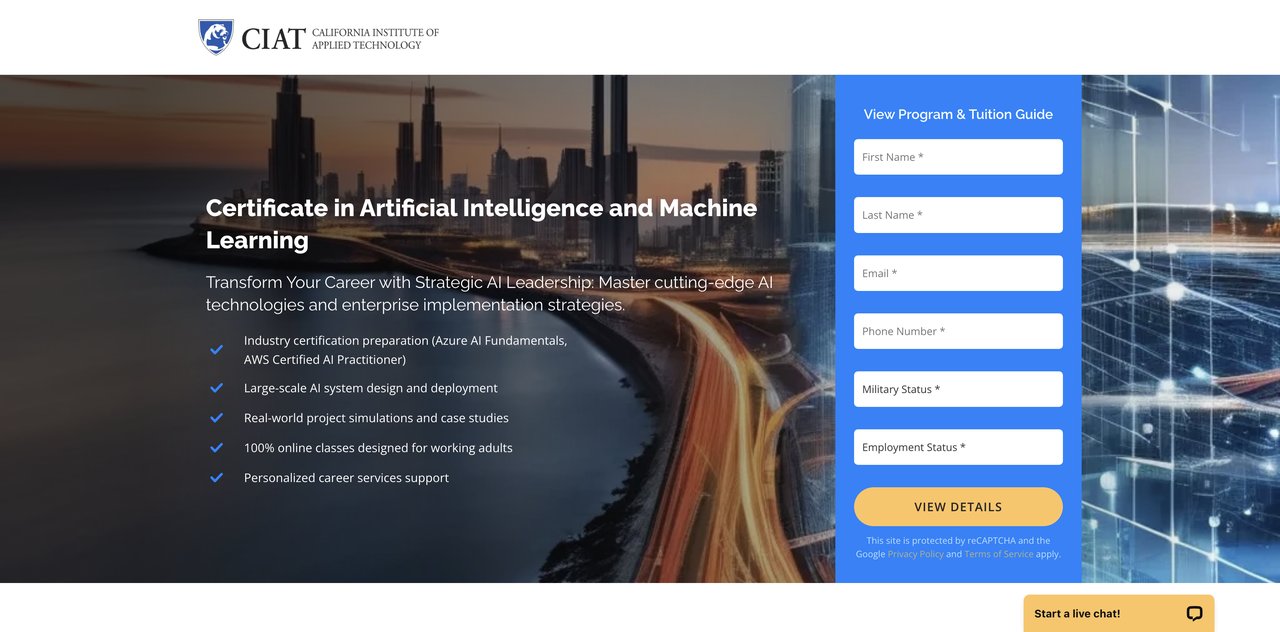
The Certificate in Artificial Intelligence and Machine Learning from CIAT prepares students for roles such as Senior Machine Learning Engineer. It features practical AI labs and training on popular frameworks, with live instructor-led courses. Prerequisites include 2+ years of IT experience and cloud technology familiarity.
Key Topics Covered: Practical AI labs, popular frameworks, AI solutioning.
Target Audience and Skill Level Requirements: Targeted at professionals with significant IT experience.
- Pros:
- Live instruction.
- Practical labs.
- Career-focused training.
- Cons:
- Requires significant prior IT experience.
Who Would Benefit Most: Experienced IT professionals aiming to transition into AI roles.
Course 5: Big Data, Artificial Intelligence and Ethics by UC Davis
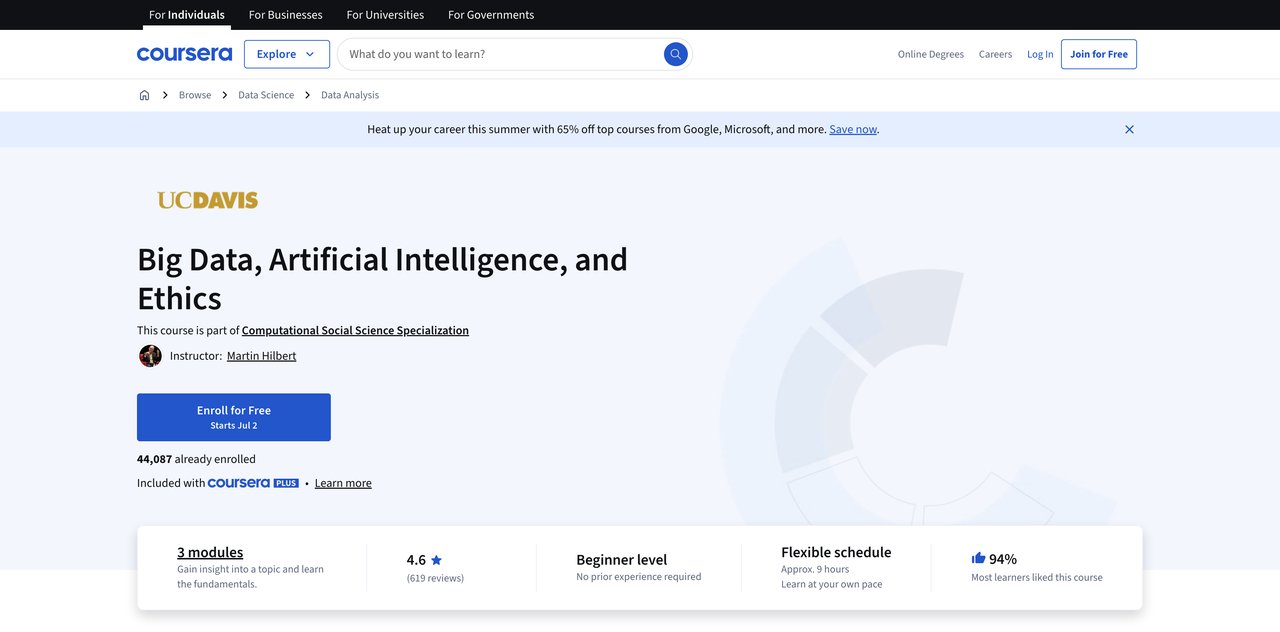
Big Data, Artificial Intelligence and Ethics by UC Davis via Coursera is an introductory course that covers big data opportunities, limitations, and AI ethics. It includes hands-on experience with IBM Watson for NLP and real-world AI case studies.
Key Topics Covered: AI ethics, big data, IBM Watson for NLP.
Target Audience and Skill Level Requirements: Beginner-friendly, suitable for those new to AI.
- Pros:
- Beginner-friendly.
- Flexible pacing.
- Ethical focus.
- Cons:
- Short duration.
- Introductory level only.
Who Would Benefit Most: Individuals new to AI who want an ethical perspective.
Course 6: AI for Business Specialization by University of Pennsylvania
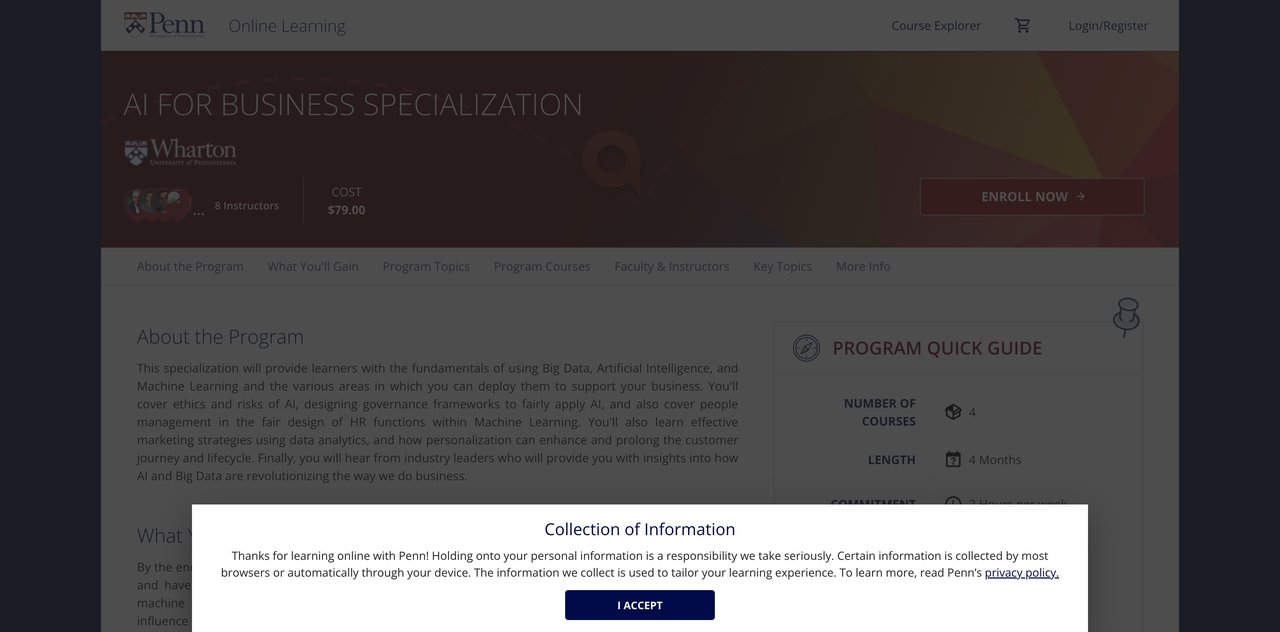
The AI for Business Specialization from the University of Pennsylvania (Wharton) explores AI applications in business contexts like marketing, finance, and HR. The course covers AI fundamentals, ethical AI strategies, and practical tools like TensorFlow.
Key Topics Covered: AI in business, TensorFlow, ethical AI strategies.
Target Audience and Skill Level Requirements: Designed for business professionals with an interest in AI applications.
- Pros:
- Business-focused.
- Practical applications.
- Affordable pricing.
- Cons:
- Requires 2 hours/week commitment.
Who Would Benefit Most: Business professionals seeking to integrate AI into their strategies.
Course 7: CS50’s Introduction to Artificial Intelligence with Python by Harvard University
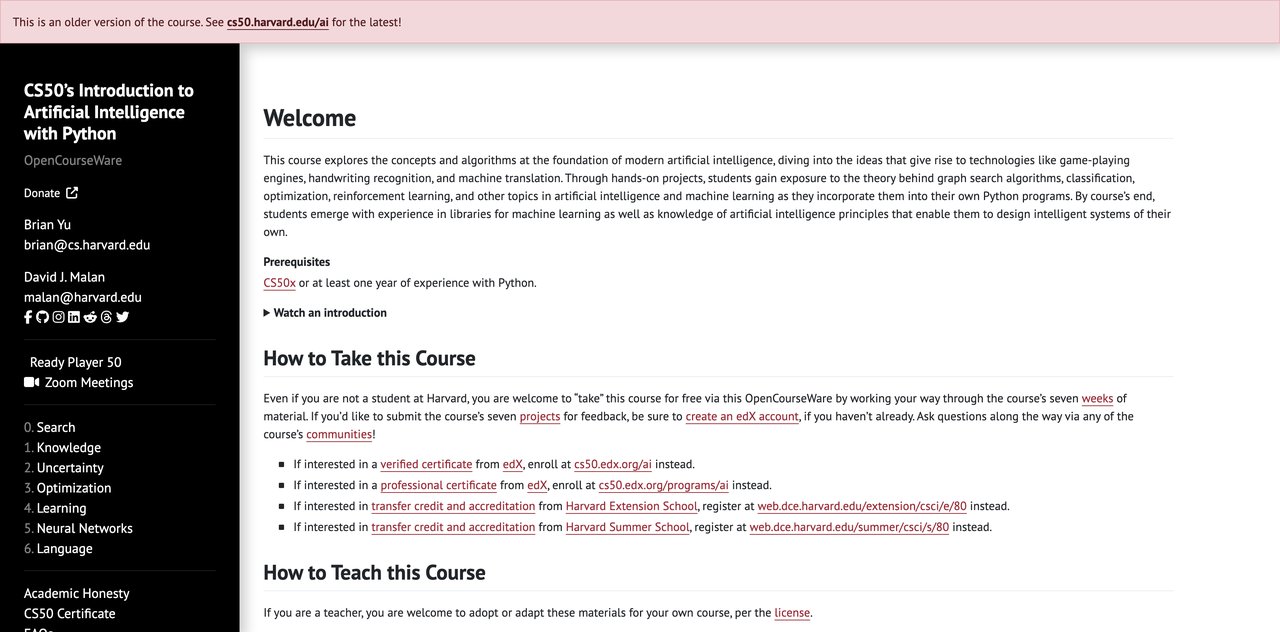
CS50’s Introduction to Artificial Intelligence with Python offers a seven-week course that balances theoretical and practical AI knowledge. It covers graph search, reinforcement learning, and practical AI projects such as game-playing engines.
Key Topics Covered: Graph search, reinforcement learning, AI project implementation.
Target Audience and Skill Level Requirements: Intermediate level, suitable for those with some Python knowledge.
- Pros:
- Strong theoretical and practical balance.
- Harvard credential.
- Cons:
- Time-intensive.
Who Would Benefit Most: Intermediate learners seeking a rigorous AI course with practical projects.
Course 8: AI & ML Education by Andrej Karpathy (YouTube)
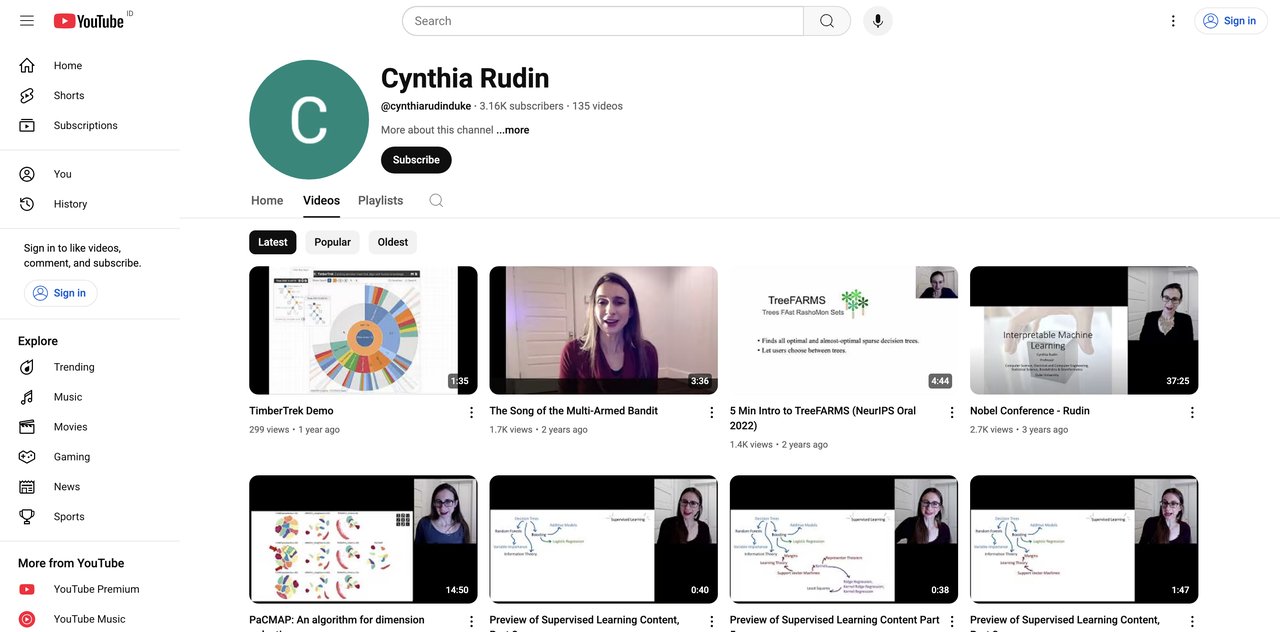
AI & ML Education by Andrej Karpathy provides free, code-focused tutorials on YouTube. Topics include building GPT models and LLM fundamentals. These educational videos are ideal for those with self-motivation and prior coding knowledge.
Key Topics Covered: GPT models, tokenization, large language models.
Target Audience and Skill Level Requirements: Suitable for self-motivated learners with coding experience.
- Pros:
- Deep technical insights.
- Free access.
- Cons:
- Requires self-motivation and prior coding knowledge.
Who Would Benefit Most: Self-driven individuals with coding skills seeking technical insights into AI.
Course 9: Interpretable Machine Learning by Cynthia Rudin (YouTube)
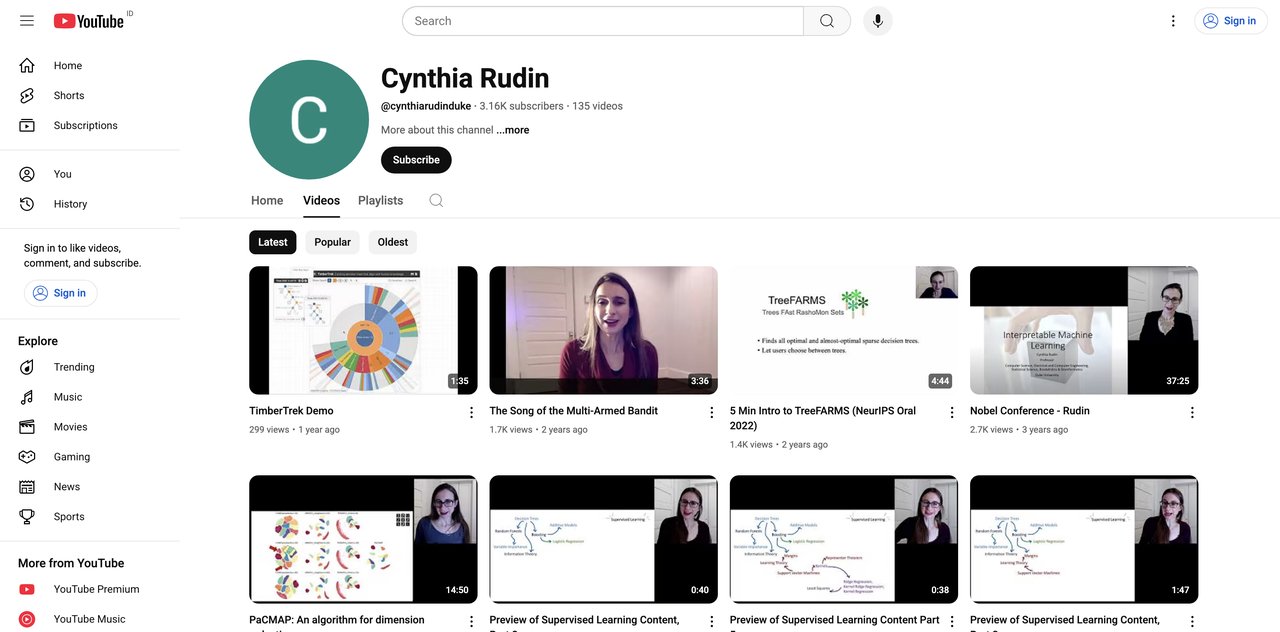
Interpretable Machine Learning by Cynthia Rudin offers educational videos on interpretable machine learning concepts. The focus is on mathematical intuition and theoretical foundations.
Key Topics Covered: Statistical learning theory, kernel methods, interpretable ML concepts.
Target Audience and Skill Level Requirements: Suitable for those interested in theoretical understanding.
- Pros:
- Advanced theoretical focus.
- Free access.
- Cons:
- More academic, less hands-on coding.
Who Would Benefit Most: Learners interested in the theoretical aspects of interpretable machine learning.
Course 10: Certificate Program in AI Business Strategy by Johns Hopkins University
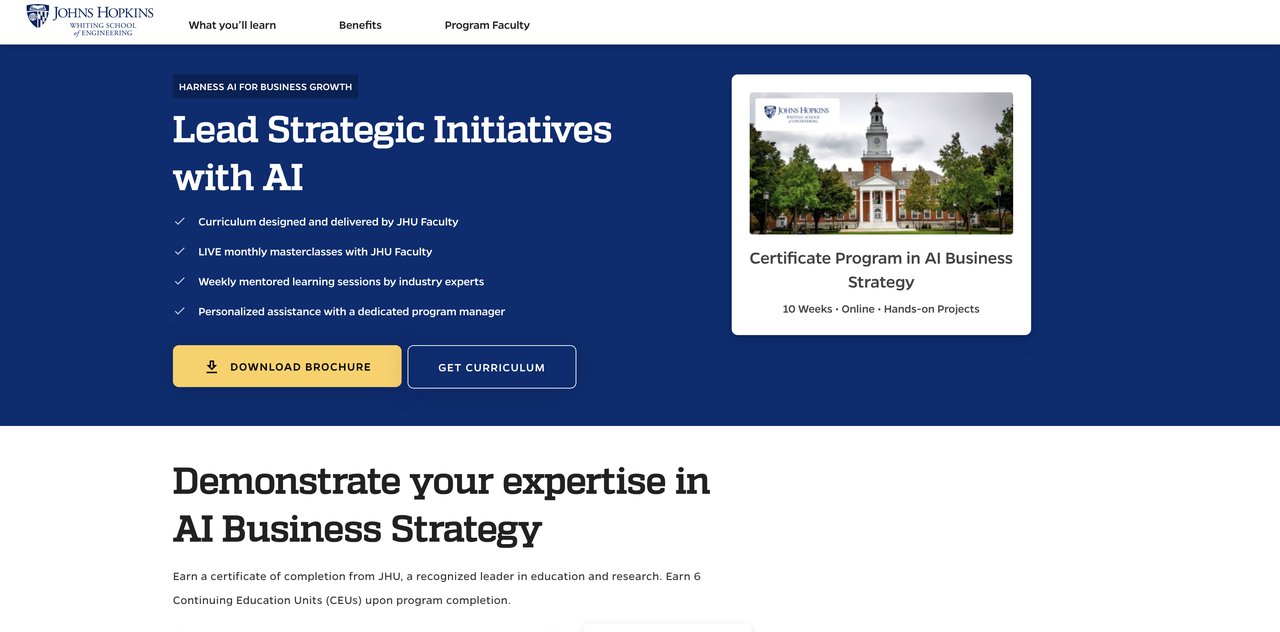
The Certificate Program in AI Business Strategy focuses on AI business strategy, ethics, and risk management. The 10-week online program includes live masterclasses and mentorship from industry experts, designed for project managers and technology leaders.
Key Topics Covered: AI business strategy, ethics, risk management, solutioning.
Target Audience and Skill Level Requirements: Designed for project managers, consultants, and executives.
- Pros:
- Business and strategy focus.
- Mentorship from industry experts.
- Industry connections.
- Cons:
- Higher cost.
Who Would Benefit Most: Business leaders aiming to incorporate AI into strategic planning.
Course 11: Develop LLM Powered Applications with LangChain by Udemy
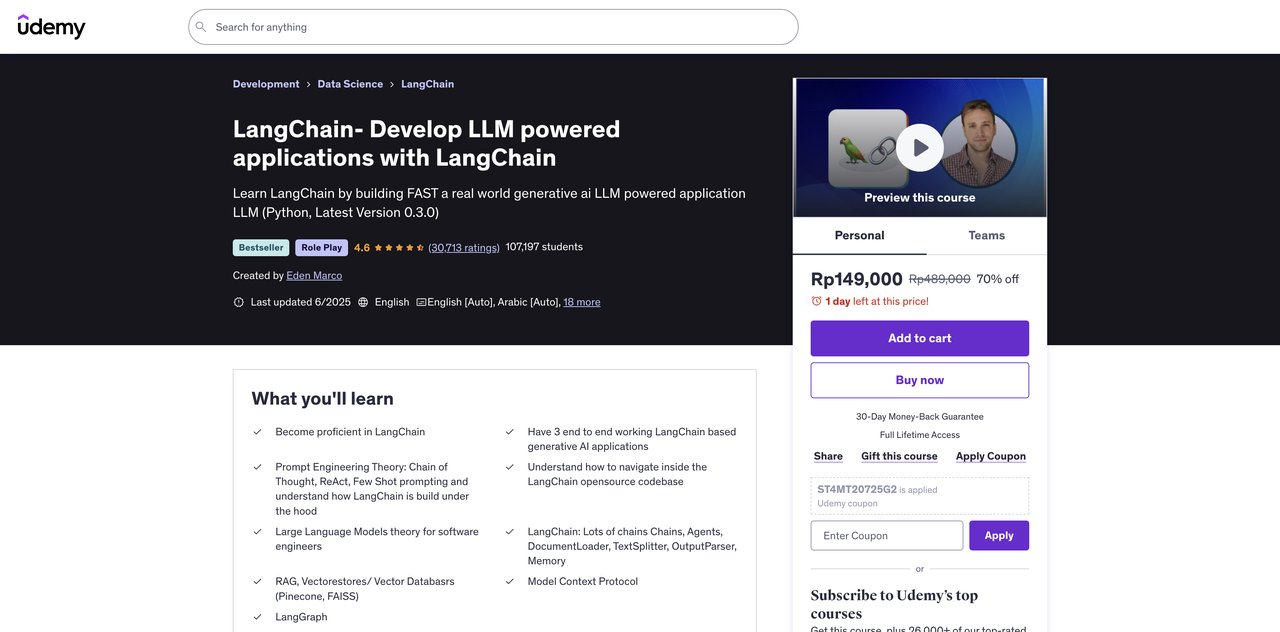
Develop LLM Powered Applications with LangChain is a course designed for Python-experienced software engineers. It covers building real-world large language model applications, including prompt engineering and Retrieval-Augmented Generation.
Key Topics Covered: LangChain, prompt engineering, RAG, vector databases.
Target Audience and Skill Level Requirements: Designed for software engineers with Python experience.
- Pros:
- Affordable pricing.
- Practical and up-to-date content.
- Cons:
- Requires Python experience.
Who Would Benefit Most: Software engineers seeking to build practical LLM applications.
Course 12: Artificial Intelligence Graduate Certificate by Stanford University
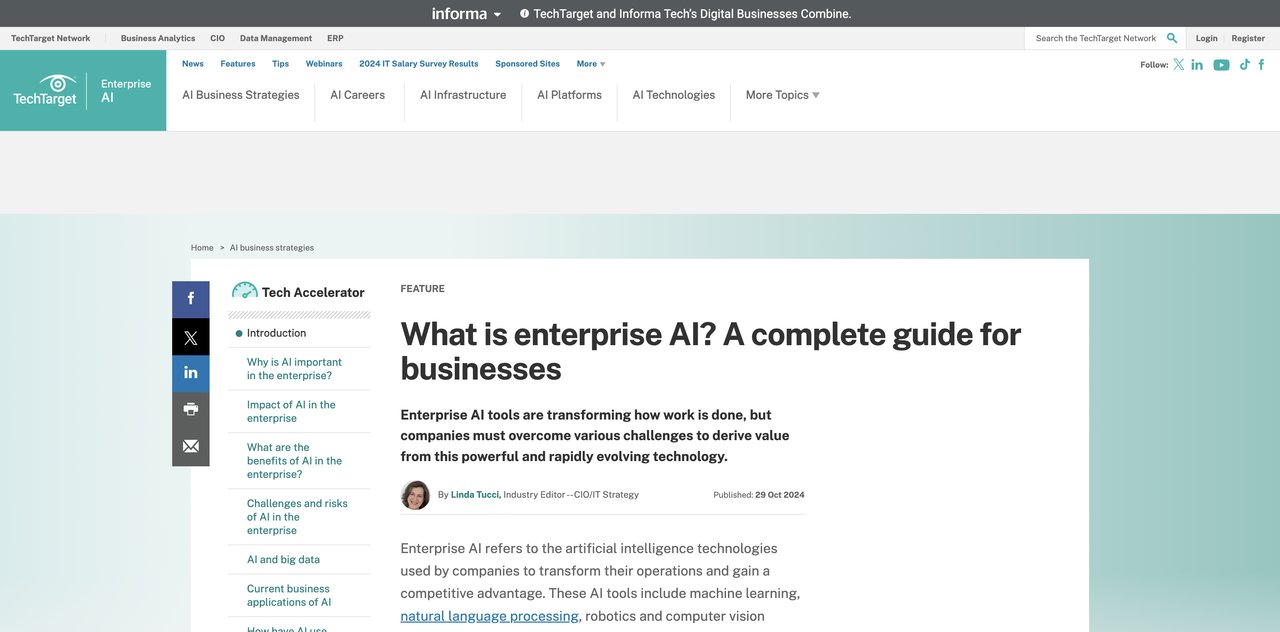
The Artificial Intelligence Graduate Certificate from Stanford University covers foundational AI principles, requiring a bachelor's degree and experience in calculus, linear algebra, probability, and programming.
Key Topics Covered: Logic, probabilistic models, machine learning, robotics, NLP.
Target Audience and Skill Level Requirements: Suitable for those with a strong academic background and prior experience.
- Pros:
- Prestigious institution.
- Comprehensive foundational coverage.
- Cons:
- Prerequisites and academic requirements.
Who Would Benefit Most: Academically inclined professionals seeking comprehensive AI education.
Course 13: Professional Certificate Program in Machine Learning and AI by MIT
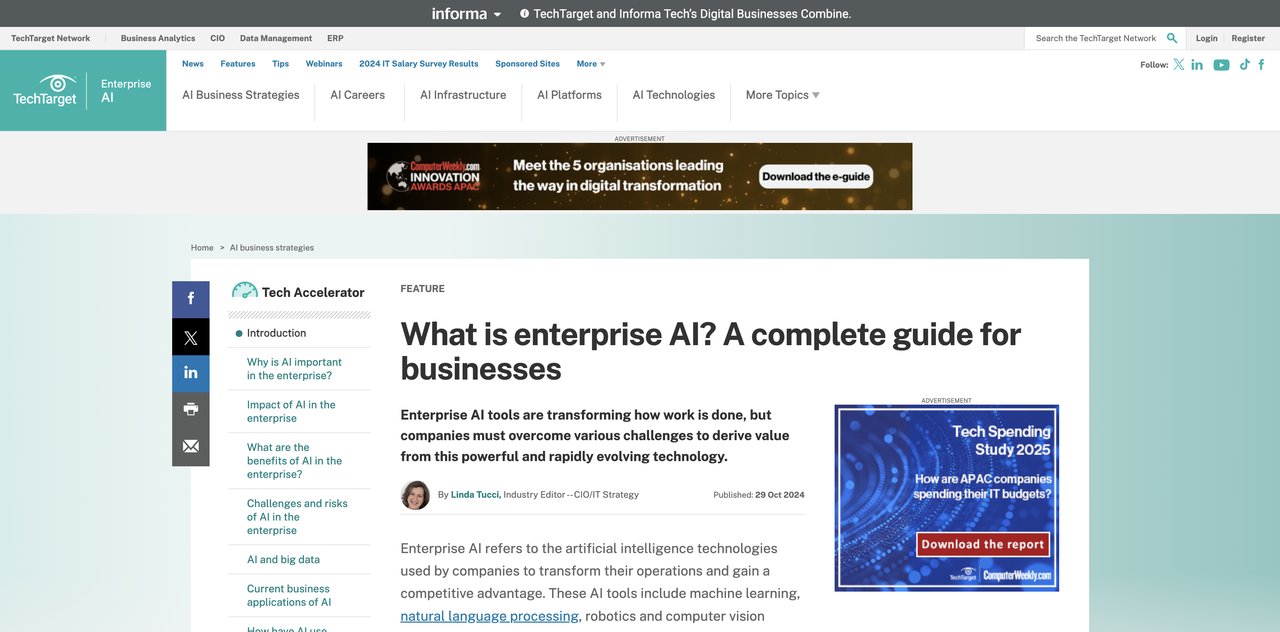
The Professional Certificate Program in Machine Learning and AI by MIT offers an intensive 16-day program. It covers cognitive technology and predictive modeling, taught by MIT professors. The program is recommended for technical professionals with 3+ years of experience.
Key Topics Covered: Cognitive technology, predictive modeling, machine learning.
Target Audience and Skill Level Requirements: Suited for experienced technical professionals.
- Pros:
- Taught by MIT professors.
- Intensive and comprehensive.
- Cons:
- Expensive.
- Requires technical background.
Who Would Benefit Most: Experienced technical professionals seeking an intensive AI learning experience.
Course 14: Artificial Intelligence: Business Strategies and Applications by UC Berkeley
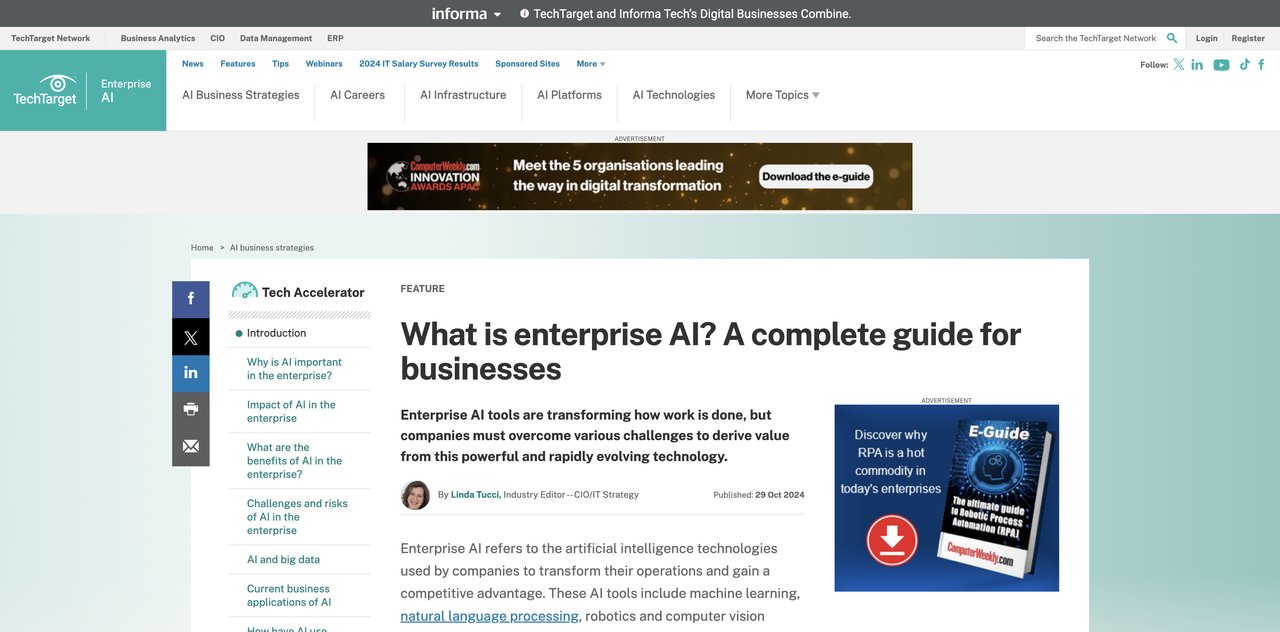
Artificial Intelligence: Business Strategies and Applications by UC Berkeley focuses on integrating AI into organizations, covering AI’s capabilities and applications. It targets senior leaders and managers.
Key Topics Covered: AI technologies, machine learning, deep learning, organizational integration.
Target Audience and Skill Level Requirements: Designed for senior leaders and managers.
- Pros:
- Focus on organizational integration.
- Covers a wide range of AI technologies.
- Cons:
- Designed for senior leaders and managers.
Who Would Benefit Most: Senior leaders and managers looking to integrate AI into their organizations.
Course 15: IBM Applied AI Professional Certificate by IBM
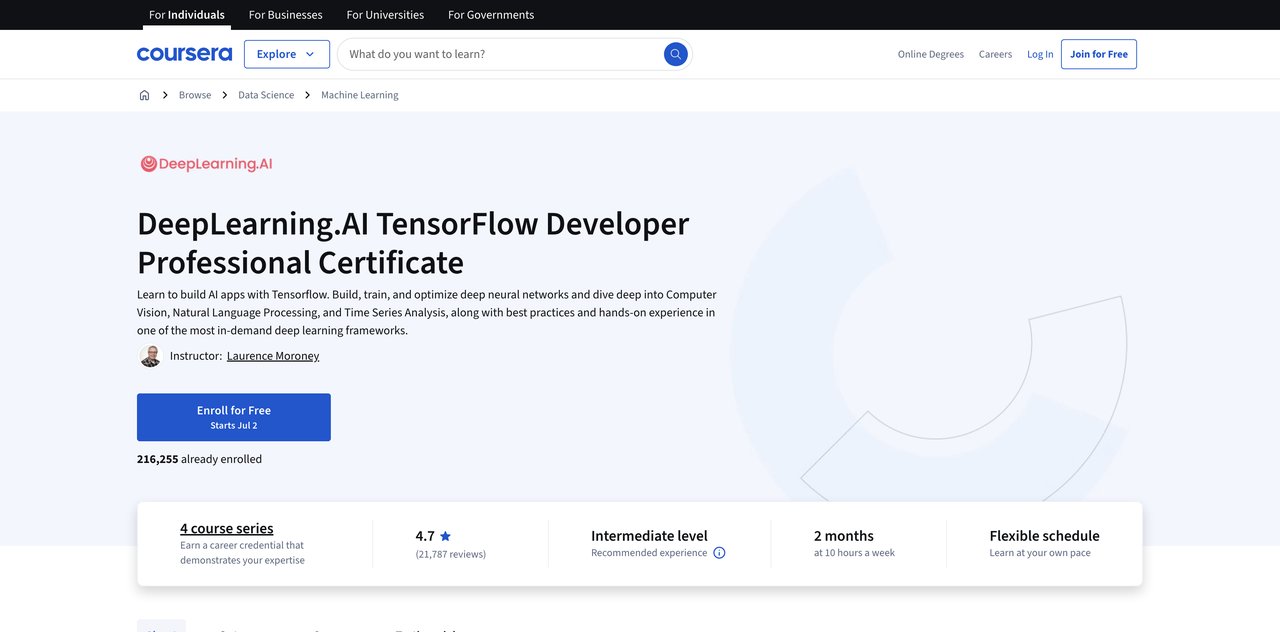
The IBM Applied AI Professional Certificate on Coursera is a beginner-level course teaching AI basics and applications. It includes hands-on experience with IBM Watson AI services and Python with minimal coding.
Key Topics Covered: AI basics, machine learning, IBM Watson AI services.
Target Audience and Skill Level Requirements: Beginner-friendly, requires minimal Python knowledge.
- Pros:
- Beginner-friendly.
- Hands-on with IBM Watson.
- Minimal coding required.
- Cons:
- Some Python knowledge required for final courses.
Who Would Benefit Most: Beginners looking for a hands-on introduction to AI.
Course 16: Deep Learning Specialization by Andrew Ng via Coursera
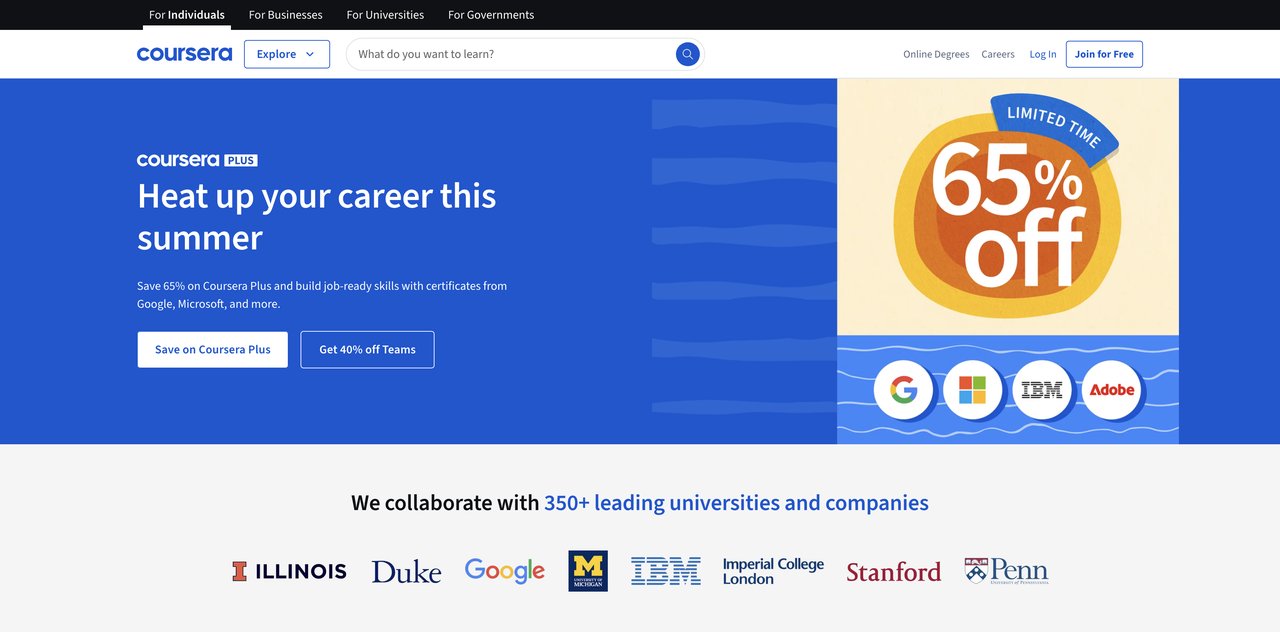
Deep Learning Specialization covers neural networks, convolutional and recurrent neural networks, and transformer models. Taught by Andrew Ng, the course requires intermediate Python and ML knowledge.
Key Topics Covered: Neural networks, deep learning, NLP, transformer models.
Target Audience and Skill Level Requirements: Suitable for those with intermediate Python and ML knowledge.
- Pros:
- Comprehensive deep learning coverage.
- Taught by Andrew Ng.
- Cons:
- Requires intermediate Python and ML knowledge.
Who Would Benefit Most: Learners with existing ML knowledge seeking to specialize in deep learning.
Course 17: Introduction to TensorFlow for AI, ML, and DL by deeplearning.ai
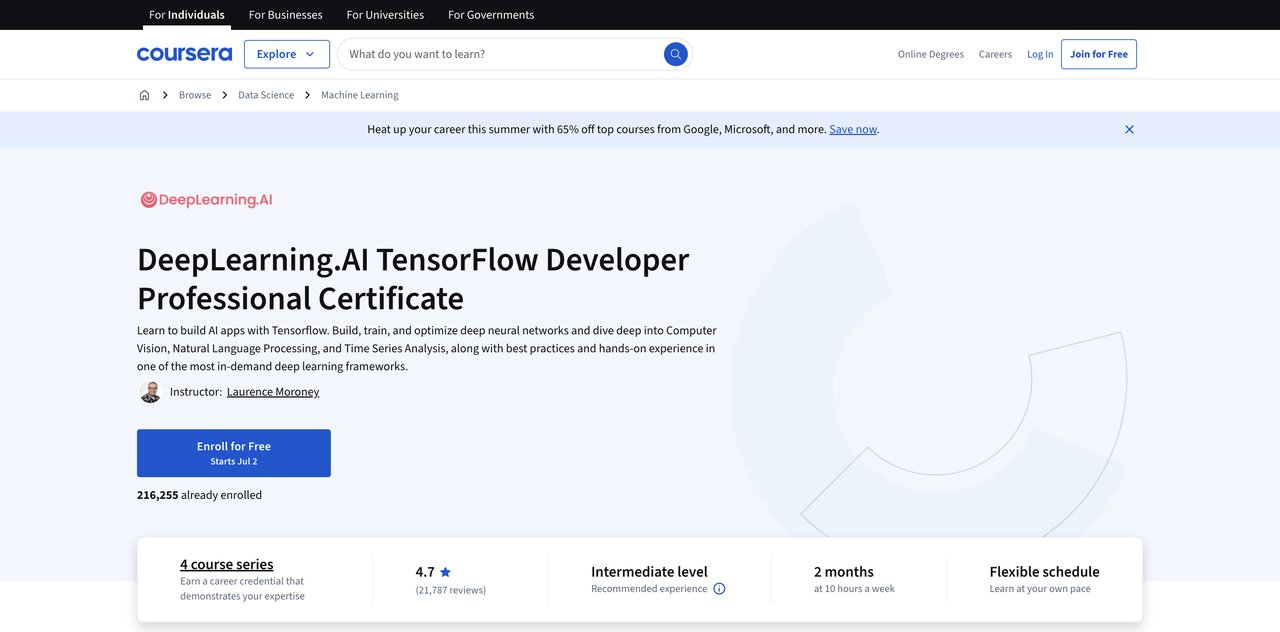
Introduction to TensorFlow for AI, ML, and DL is a beginner-friendly course teaching TensorFlow best practices. It's part of the TensorFlow Developer Professional Certificate.
Key Topics Covered: TensorFlow, neural network building, model training for computer vision.
Target Audience and Skill Level Requirements: Beginners with Python coding experience.
- Pros:
- Hands-on TensorFlow training.
- Beginner-friendly.
- Cons:
- Requires Python coding experience.
Who Would Benefit Most: Beginners interested in learning TensorFlow for AI projects.
Course 18: Artificial Intelligence A-Z 2024: Build 7 AI + LLM & ChatGPT by Udemy
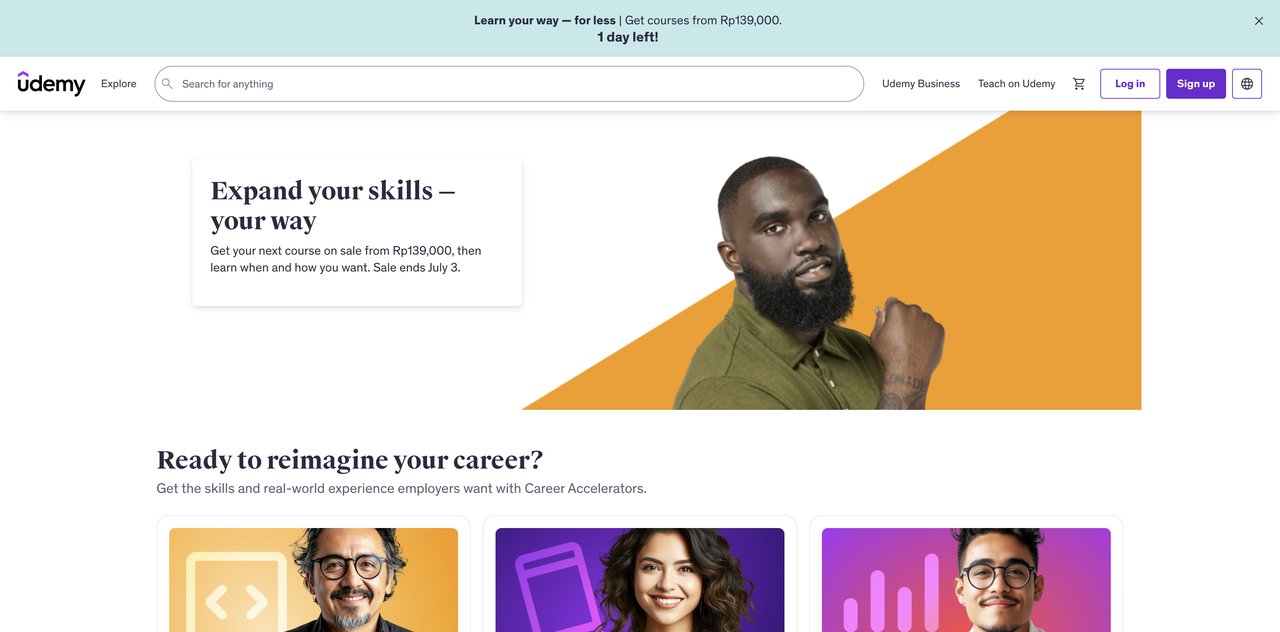
Artificial Intelligence A-Z 2024 is a comprehensive course with 22 sections covering AI, machine learning, and NLP for chatbots. It includes seven practical AI projects.
Key Topics Covered: AI, machine learning, LLMs, NLP, reinforcement learning.
Target Audience and Skill Level Requirements: Requires Python programming knowledge.
- Pros:
- Extensive content.
- Project-based learning.
- Cons:
- Requires Python programming knowledge.
Who Would Benefit Most: Programmers seeking a comprehensive, project-based AI course.
Course 19: Google Cloud's Introduction to Generative AI Learning Path

Google Cloud's Introduction to Generative AI Learning Path is a beginner-friendly course focusing on Google's AI tools and responsible AI considerations.
Key Topics Covered: Generative AI, large language models, responsible AI.
Target Audience and Skill Level Requirements: Beginners interested in Google Cloud's AI ecosystem.
- Pros:
- Beginner-friendly.
- Covers responsible AI.
- Cons:
- Limited to Google Cloud ecosystem.
Who Would Benefit Most: Beginners looking to learn generative AI within Google's ecosystem.
Course 20: Artificial Intelligence Engineer (AIE) Certification Process by ARTiBA
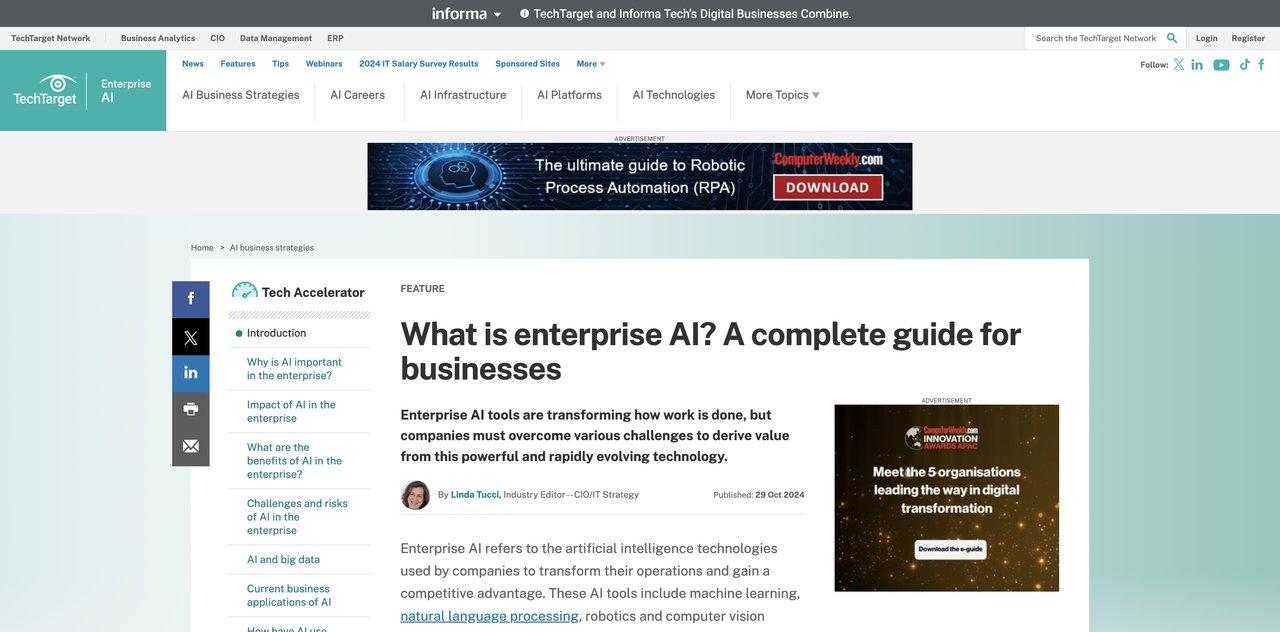
Artificial Intelligence Engineer (AIE) Certification offers a comprehensive certification process covering various learning tracks. It is industry-recognized and requires programming knowledge.
Key Topics Covered: Machine learning, neural networks, NLP, cognitive computing.
Target Audience and Skill Level Requirements: Suitable for those with programming knowledge.
- Pros:
- Comprehensive certification tracks.
- Industry-recognized credentials.
- Cons:
- Prerequisites vary by track.
Who Would Benefit Most: Professionals seeking formal certification in AI engineering.
Course 21: Master the Fundamentals of AI and ML by LinkedIn Learning
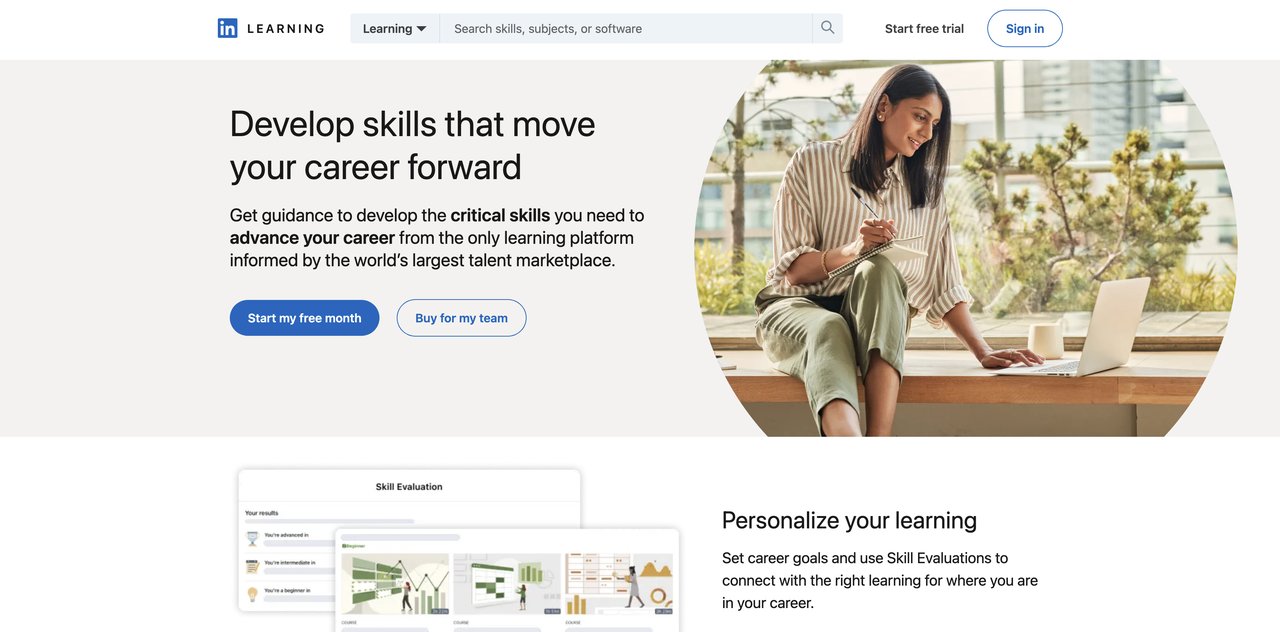
Master the Fundamentals of AI and ML on LinkedIn Learning covers AI foundations and cognitive technologies. It's accessible to all experience levels and focuses on business impact.
Key Topics Covered: AI foundations, machine learning, explainable AI, cybersecurity.
Target Audience and Skill Level Requirements: Suitable for all experience levels.
- Pros:
- Accessible for all experience levels.
- Covers business impact and trends.
- Cons:
- Less technical depth.
Who Would Benefit Most: Professionals interested in understanding AI's impact on business.
Overall Recommendations
For IT consultants looking to expand their knowledge in AI, the options are diverse. CompleteAI Training stands out for its comprehensive and affordable approach, especially suited for those wanting continuous updates on AI tools and industry news. For hands-on learners with a technical background, the Udacity Nanodegree and Harvard CS50’s AI course provide robust project-based learning. Business-oriented professionals may benefit from the Wharton AI for Business Specialization or Johns Hopkins AI Business Strategy courses. Ultimately, the best course will depend on career goals, current skill level, and preferred learning style.




